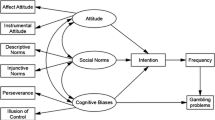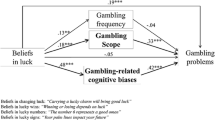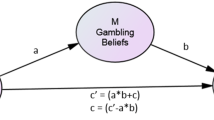Abstract
Theory and research have revealed the impact of cognitive factors on propensity for gambling, but the role of generalized beliefs and their underlying mechanisms receive little attention. In the present research, we operationalized generalized beliefs as social axioms (Leung et al. in J Cross Cult Psychol 33:286–302, 2002) and tested how the axiom factors of fate control and social cynicism affected the likelihood to gamble in hypothetical scenarios (Study 1) and the actual behaviour of gambling (Study 2). In Study 1, we found that both fate control and social cynicism positively predicted the propensity to participate in horse betting and casino gambling among university students (n = 184). The effect of fate control was mediated by perceived benefit of gambling, whereas social cynicism affected gambling propensity directly. In Study 2, we showed the same effects of fate control and social cynicism on gambling frequency among at-risk adolescents (n = 547), and identified two types of gambling-related cognition (i.e., distortive gambling cognitions and attitudes towards money) as mediators. Overall, this research provided evidence for the importance of social beliefs in formulating specific gambling cognitions and gambling behaviours, shedding light on intervention strategies for helping frequent gamblers through altering their worldviews in general and risk-taking beliefs in particular.



Similar content being viewed by others
References
Andresen, B. (2000). Six basic dimensions of personality and a seventh factor of generalized dysfunctional personality: A diathesis system covering all personality disorders. Neuropsychobiology, 41, 5–23.
Au, E. W. M., Chiu, C-Y., Zhang, Z-H., Mallorie, L., Chaturvedi, A., & Viswanathan, M. et al. (2011). Negotiable fate: Social ecological foundation and psychological functions. Journal of Cross-Cultural Psychology, 43, 931–942.
Bentler, P. M. (1995). EQS: Structural equations program manual. Encino, CA: Multivariate Software Inc.
Bond, M. H., Leung, K., Au, A., Tong, K.-K., & Chemonges-Nielson, Z. (2004). Combining social axioms with values in predicting social behaviours. European Journal of Personality, 18, 177–191.
Byrne, B. M. (1994). Structural equation modeling with EQS and EQS/ windows: Basic concepts, applications, and programming. Thousands Oaks, CA: Sage Publications.
Chaturvedi, A., Chiu, C-Y., Viswanathan, M. (2009). Literacy, negotiable fate, and thinking style among low income women in India. Journal of Cross-Cultural Psychology, 40, 880–893.
Chen, L., & Zhang, J. (2004). Relation between general social beliefs and interpersonal conflict resolution styles. Chinese Journal of Clinical Psychology, 12, 151–153. (in Chinese).
Chen, S. X., & Bond, M. H. (2012). Lay beliefs about psychological and social problems among adolescents: Motivational and cognitive antecedents. Journal of Applied Social Psychology, 42, 170–194.
Chen, S. X., Fok, H. K., Bond, M. H., & Matsumoto, D. (2006). Personality and beliefs about the world revisited: Expanding the nomological network of social axioms. Personality and Individual Differences, 41, 201–211.
Chen, S. X., Lam, B. C. P., Wu, W. C. H., Ng, J. C. K., Buchtel, E. E., Guan, Y., et al. (2016). Do people’s worldviews matter? The why and how. Journal of Personality and Social Psychology, 110, 743–765.
Chen, S. X., Wu, W. C. H., & Bond, M. H. (2009). Linking family dysfunction to suicidal ideation: The mediating roles of self-views and world-views. Asian Journal of Social Psychology, 12, 133–144.
Darke, P. R., & Freedman, J. L. (1997). The belief in good luck scale. Journal of Research in Personality, 31, 486–511.
Dinca, M., & Iliescu, D. (2009). Linking social axioms with behavioral indicators and personality in Romania. In K. Leung & M. H. Bond (Eds.), Psychological aspects of social axioms: Understanding global belief system (pp. 145–162). New York: Springer.
Elman, I., Tschibelu, E., & Borsook, D. (2010). Psychosocial stress and its relationship to gambling urges in individuals with pathological gambling. The American Journal on Addictions, 19(4), 332–339.
Fraser, C., & Gaskell, G. (1990). The social psychological study of widespread beliefs. Oxford: Glarendon.
Furnham, A. (1988). Lay theories. London: Pergamon.
Goodie, A. S. (2005). The role of perceived control and overconfidence in pathological gambling. Journal of Gambling Studies, 21, 481–502.
Job, R. F. S., Hamer, V., & Walker, M. (1995). The effects of optimism bias and fear on protective behaviour. In D. Kenny & R. F. S. Job (Eds.), Australia’s adolescents: A health psychology perspective (pp. 151–156). Armidale: New England University Press.
Koltko-Rivera, M. E. (2004). The psychology of worldviews. Review of General Psychology, 8, 3–58.
Kuo, B. C. H., Kwantes, C. T., Towson, S., & Nanson, K. M. (2006). Social beliefs as determinants of attitudes toward seeking professional psychological help among ethnically diverse university students. Canadian Journal of Counselling, 40, 224–241.
Ladouceur, R., & Walker, M. (1996). A cognitive perspective on gambling. In P. M. Salkoskvis (Ed.), Trends in cognitive and behavioral therapies (pp. 89–120). New York: Wiley.
Lai, J. H., Bond, M. H., & Hui, N. H. (2007). The role of social axioms in predicting life satisfaction: A longitudinal study in Hong Kong. Journal of Happiness Studies, 8, 517–535.
Langer, E. (1975). The illusion of control. Journal of Personality and Social Psychology, 32, 311–328.
Lemmens, J. S., Valkenburg, P. M., & Peter, J. (2011). Psychosocial causes and consequences of pathological gaming. Computers in Human Behavior, 27(1), 144–152.
Leung, K., & Bond, M. H. (2004). Social axioms: A model for social beliefs in multicultural perspective. Advances in Experimental Social Psychology, 36, 119–197.
Leung, K., & Bond, M. H. (2008). Psycho-logic and eco-logic: Insights from social axiom dimensions. In F. van de Vijver, D. van Hemert, & Y. P. Poortinga (Eds.), Individuals and cultures in multilevel analysis (pp. 197–219). Mahwah, NJ: Erlbaum.
Leung, K., & Bond, M. H. (Eds.). (2009). Psychological aspects of social axioms: Understanding global belief systems. New York: Springer.
Leung, K., Bond, M. H., de Carrasquel, S. H., Muñoz, C., Hernández, M., Murakami, F., et al. (2002). Social axioms: The search for universal dimensions of general beliefs about how the world functions. Journal of Cross-Cultural Psychology, 33, 286–302.
Leung, K., Lam, B. C. P., Bond, M. H., Conway, L. G., III, Gornick, L. J., Amponsah, B., et al. (2012). Developing and evaluating the social axioms survey in eleven countries: Its relationship with the five-factor model of personality. Journal of Cross-Cultural Psychology, 43, 833–857.
Neto, F. (2006). Dimensions and correlates of social axioms among a Portuguese sample. Individual Differences Research, 4, 340–351.
Oceja, L. (2009). Process of transmission and change of social axioms and their behavioral influence in Spanish culture. In K. Leung & M. H. Bond (Eds.), Psychological aspects of social axioms: Understanding global belief system (pp. 129–141). New York: Springer.
Oei, T. P. S., Lin, J., & Raylu, N. (2007). Validation of the Chinese version of the Gambling related cognitions scale (GRCS-C). Journal of Gambling Studies, 23, 309–322.
Pennings, J. M. E., & Smidts, A. (2003). The shape of utility functions & organizational behavior. Management Science, 49(9), 1251–1263.
Platz, L., & Millar, M. (2001). Gambling in the context of other recreation activity: A quantitative comparison of casual and pathological student gamblers. Journal of Leisure Research, 33(4), 383–395.
Raylu, N., & Oei, T. P. S. (2004). The Gambling Related Cognitions Scale (GRCS): Development, confirmatory factor validation and psychometric properties. Addiction, 99, 757–769.
Rohrmann, B. (2004). Risk Attitude Scales: Concepts and questionnaires. Project report, Department of Psychology, University of Melbourne. Retrieved August 2012, from http://www.rohrmannresearch.net/pdfs/rohrmann-racreport.pdf.
Safdar, S., Lewis, J. R., & Daneshpour, M. (2006). Social axioms in Iran and Canada: Intercultural contact, coping and adjustment. Asian Journal of Social Psychology, 9, 123–131.
Scheier, M. F., Carver, C. S., & Bridges, M. W. (1994). Distinguishing optimism from neuroticism (and trait anxiety, self-mastery, and self-esteem): A reevaluation of the life orientation test. Journal of Personality and Social Psychology, 67, 1063–1078.
Schubert, R., Brown, M., Gysler, M., & Brachinger, H. W. (1999). Financial decision making: Are women really more risk averse? The American Economic Review, 89, 381–385.
Sloan, F. A., Eldred, L. M., Guo, T., & Xu, Y. (2013). Are people overoptimistic about the effects of heavy drinking? Journal of Risk and Uncertainty, 47(1), 93–127.
Sohl, S. J., Moyer, A., Lukin, K., & Knapp-Oliver, S. K. (2011). Why are optimists optimistic? Individual Differences Research, 9, 1–11.
Stewart, S. H., Zack, M., Collins, P., Klein, R. M., & Fragopoulos, F. (2008). Subtyping pathological gamblers on the basis of affective motivations for gambling: Relations to gambling problems, drinking problems, and affective motivations for drinking. Psychology of Addictive Behaviors, 22(2), 257–268.
Sue, D. W. (1990). Counseling the culturally different: Theory & practice (2nd ed.). New York: Wiley.
Tang, C. S., & Wu, A. M. (2010). Direct and indirect influences of fate control belief, gambling expectancy bias, and self-efficacy on problem gambling and negative mood among Chinese college students: A multiple mediation analysis. Journal of Gambling Studies, 26, 533–543.
Tang, T. L. P. (1995). The development of a short money ethic scale: Attitudes toward money and pay satisfaction revised. Personality and Individual Difference, 19(6), 809–816.
Tang, T. L. P., Furnham, A., & Wu-Davis, G. M. T. (2002). The meaning of money: The money ethic endorsement and work-related attitudes in Taiwan, the USA and the UK. Journal of Managerial Psychology, 17(7), 542–563.
Toneatto, T., Vettese, L., & Nguyen, L. (2007). The role of mindfulness in the cognitive-behavioral treatment of problem gambling. Journal of Gambling Issues, 19, 91–100.
Treloar, H. R., Morris, D. H., Pedersen, S. L., & McCarthy, D. M. (2012). Direct and indirect effects of impulsivity traits on drinking-and-driving behavior in young adults. Journal of Studies on Alcohol and Drugs, 73, 794–803.
Wang, L. S., Chen, J. Y., Lin, M. C., & Wang, M. C. (2008). The relationship between leisure satisfaction and life satisfaction of adolescents concerning online games. Adolescence, 43, 177–184.
Wild, L. G., Flisher, A. J., Bhana, A., & Lombard, C. (2004). Associations among adolescent risk behaviours and self-esteem and six domains. Journal of Child Psychology and Psychiatry, 45(8), 1454–1467.
Wong, S. S. K., & Tsang, S. K. M. (2011). Validation of the Chinese version of the Gamblers’ Belief Questionnaire (GBQ-C). Journal of Gambling Studies, 28, 561–572.
Wood, R. T. A., Gupta, R., Derevensky, J. L., & Griffiths, M. (2004). Video game playing and gambling in adolescents: Common risk factors. Journal of Child and Adolescent Substance Abuse, 14, 77–100.
Zhou, K., Hui, T., Yue, S., Gui-Hai, H., Li-Lin, R., Zhu-Yuan, L., et al. (2011). Belief in luck or in skill: Which locks people into gambling? Journal of Gambling Studies, 28(3), 379–391.
Funding
This project was supported in part by the General Research Fund (#541212) and Humanities and Social Sciences Prestigious Fellowship Scheme (#35000418) from the Research Grants Council, Hong Kong.
Author information
Authors and Affiliations
Corresponding author
Ethics declarations
Conflict of interest
The authors declare that they have no conflict of interest.
Ethical Approval
All procedures performed in studies involving human participants were in accordance with the ethical standards of the institutional and/or national research committee and with the 1964 Helsinki declaration and its later amendments or comparable ethical standards.
Additional information
Publisher's Note
Springer Nature remains neutral with regard to jurisdictional claims in published maps and institutional affiliations.
We would like to express our appreciation to Victoria Ka-Ying Hui for her generous help with data collection.
Rights and permissions
About this article
Cite this article
Wu, W.C.H., Chen, S.X. & Wong, S.Sk. Predicting Gambling Propensity and Behavior: The Role of Social Axioms and Distortive Beliefs. J Gambl Stud 35, 969–986 (2019). https://doi.org/10.1007/s10899-019-09861-0
Published:
Issue Date:
DOI: https://doi.org/10.1007/s10899-019-09861-0




